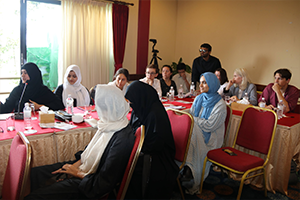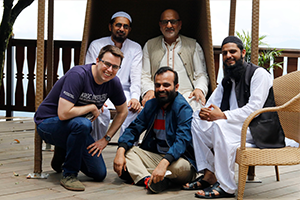Contending Modernities Initiative
Contending Modernities (CM) is a major interdisciplinary effort to generate new knowledge and greater understanding of the ways in which religious and secular forces interact in the modern world. Under the leadership of R. Scott Appleby, Ebrahim Moosa, and Atalia Omer, CM involves dozens of scholars, public intellectuals, and religious and secular leaders from universities and research institutes around the world.
At its start, the initiative examined how Islam and Catholicism have understood, accommodated, altered, and resisted radical transformations that have characterized the modern world. As the program has grown, CM has engaged other discursive traditions and expanded its geographic focus to include projects in Indonesia, South Asia, and Sub-Saharan Africa, and introduced a thematic focus on decoloniality.
Madrasa Discourses

Part of the CM initiative is dedicated to the Madrasa Discourses project, which equips Islamic religious leaders (ʿulamāʾ) with the tools necessary to confidently engage pluralism, modern science, technological advances, and new philosophies. Focused initially in India and Pakistan, home to more than 300 million Muslims, the project has engaged hundreds of scholars, professors, and writers through deep interactive coursework and cross-cultural experiences.

In July 2022, Madrasas Discourses led its sixth annual two-week intensive course, this time in Nepal, for approximately 25 Indian, 25 Pakistani, and 10 American students and faculty. Guest lecturer Tal Howard wrote a feature about his experience in the March 2023 issue of Commonweal.

Within the summer intensive course, Professor Sameena Kausar of Maulana Azad National Urdu University led students and faculty in a discussion of feminist interpretations of tradition and the role of women in the madrasa today. In another session, Professor Ananya Vajpeyi, fellow at the Centre for the Study of Developing Societies in Delhi, tied concepts of political theory and modernity to a discussion of South Asia’s calamitous partition. For many students, this was the first time they had heard alternate narratives about the foundational event, as well as the first opportunity to discuss it with young colleagues from across the border. Outside of the classroom, students held conversations across faith and culture late into the evening, and even invited members from a local Nepali madrasa to visit.
Visiting Lecture Series
CM Program Manager Dania Straughan arranged for scholars to visit the University and present in-person lectures on a variety of topics:
-
In March 2023, Nelson Maldonado-Torres, professor of Philosophy at the University of Connecticut, presented on the extent to which decolonial forms of peace and justice depend on the expression and mobilization of counter-catastrophic ideas, artistic creations, and actions that advance the unfinished project of decoloniality.
-
Also in March 2023, Shaun A. Casey, the founding director of the U.S. Department of State’s Office of Religion and Global Affairs, lectured on the necessity of understanding global religion because of its crucial and complex role in diplomacy. A launch event and reception to celebrate Casey’s new book, Chasing the Devil at Foggy Bottom, was held following his presentation.
CM Blog
The CM blog hosted several book symposia and series this year, under the coordination of Editor Josh Lupo. These included a symposium on When Politics are Sacralized: Comparative Perspectives on Religious Claims and Nationalism, which featured contributions from scholars working in a variety of contexts, from Palestine/Israel to Northern Ireland to Zimbabwe. Together, the posts demonstrate the necessity for thinking globally when confronting the challenges of modern religious nationalism. The blog also featured a series of posts reflecting on the legacy of the late Desmond Tutu, especially his prophetic challenge to the Israeli occupation.